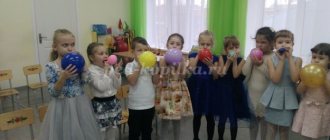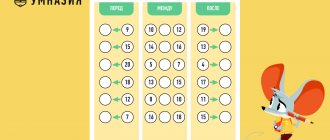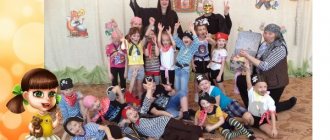Using quest games in environmental education of preschool children"
MDOU Krasnogorsk kindergarten "Solnyshko"
Using quest games in environmental education of preschool children"
Kushakova Antonida Mikhailovna
teacher of the highest category
Introduction.
The natural environment around us is amazing, but at the same time very, very fragile. Today, both children and adults need to know more about how to preserve and protect nature, because it is the source of our life.
Currently, the use of quest technologies is becoming more and more effective due to the original approach to educational activities and the presence of a fascinating plot.
The use of quest games in the work on environmental education of children helps to systematize knowledge on ecology. To form a holistic understanding of natural phenomena, the interrelations of objects of living and inanimate nature. Develops coherent speech and active vocabulary of children, activates attention and memory. Develops the ability to analyze the content of questions and riddles and give a complete meaningful answer to them. Develops the ability to work in a team and follow the rules of the game. Fosters love for native nature. In connection with the need to expand educational activities, a new technology is emerging - an educational quest, which allows you to personalize the educational process, making full use of the educational space and creating effective conditions for the improvement and personal growth of participants in educational relations. There is an element of competition in quests, as well as the effect of surprise (unexpected meeting, mystery, atmosphere, scenery). They contribute to the development of analytical abilities, develop imagination and creativity, because participants can add to live quests as they progress. The use of quests allows you to move away from traditional forms of teaching children and significantly expand the scope of the educational space.
To successfully solve this range of problems, when using quest technologies it is necessary to adhere to the following principles:
1. Accessibility (tasks should not be too difficult).
2. Systematicity (stages of the game must have a logical connection).
3. Emotional intensity (tasks should be captivating, arouse interest and a desire to act).
4. Limited time (definite time is given to complete tasks).
5. Diversity (completing tasks involves using different types of activities).
6. Safety (the game must be safe for the life, mental and physical health of the child). It is unacceptable to set tasks that involve health risks, for example, climbing a tree, jumping from a great height, going down a well.
MAGAZINE Preschooler.RF
Possibilities of quest games in environmental education of children of senior preschool ageShapirova Anna Valerievna, Educator of MADOU 42, Veliky Novgorod, Novgorod region
Institute of Continuous Pedagogical Education, Novgorod State University named after Yaroslav the Wise
FEATURES OF THE QUEST GAME IN THE ENVIRONMENTAL EDUCATION OF OLDER PRESCHOOL CHILDREN, Shapirova AV
Institute of continuing pedagogical education of Yaroslav-the-Wise Novgorod State University
Abstract: The article describes the problem of choosing various methods, means, forms when organizing the educational process. Goal: to identify the possibilities of quest games in the environmental education of children of senior preschool age. The result is the disclosure of the possibilities of using quest games in the environmental education of children of senior preschool age. The quest game is presented as an effective and relevant means of environmental education for children.
Key words: quest game, environmental quest, environmental education, senior preschool age.
Annotation: The article describes the problem of choosing a variety of methods, tools, and forms in the organization of the educational process. Purpose: to identify the possibilities of the quest game in the environmental education of older preschool children. The result is the disclosure of the possibilities of using the quest game in the environmental education of older preschool children. The quest game is presented as an effective and relevant tool for environmental education of children.
Keywords: quest-game, environmental quest, environmental education, senior preschool age.
The problem of environmental education of children has always been and remains relevant for quite a long time. There are many environmental problems all over the world, so understanding the importance of what is happening, knowing what the consequences of human activity in nature can lead to without understanding the ecological relationships in it, is important from early childhood. When the world is on the verge of an environmental disaster, with the future of all humanity at risk, it becomes obvious that environmental education and training are one of the most pressing problems of our time.
Modern teachers are faced with the task of choosing effective means of environmental education for children. In our opinion, such a means is a quest game, since in a natural and exciting form for a child it allows him to develop the necessary knowledge, skills, and personality traits. This is an innovative form of organizing children’s educational activities in preschool education, which contributes to the development of the child’s active activity position while solving game search problems [1].
In the educational process, a quest is a specially organized type of research activity, where students search for information at specified addresses, including the search for these addresses or other objects, people, tasks. This is a kind of problem that is put before the participants, where they must implement certain tasks.
In our research, the main means of environmental education for children of senior preschool age is a quest game. Let's consider the possibilities of a quest game in solving problems of environmental education of children.
The quest game is of great importance in the environmental education of children of senior preschool age. With the help of a quest game, children gain knowledge about animals, birds and insects, knowledge about the plant world, inanimate nature, and the seasons. With the help of a quest game, children show their attitude to the natural world.
The main goal of the environmental quest is to develop the skills to solve certain problems based on a competent choice of alternative options through the implementation of a certain plot.
In the process of environmental education of children of senior preschool age using quest games, the following targets can be identified:
- Expanding the environmental horizons of older preschoolers;
- Fostering a caring attitude towards the natural world;
- Involving parents in issues of environmental education of older preschoolers;
- Improving the pedagogical skills of educators;
- Creating a creative search in the selection of more effective forms and methods of working with children of senior preschool age.
With the help of a quest game, children are completely immersed in what is happening, receive positive emotions, and are involved in solving assigned problems. Such games not only allow each participant to demonstrate their knowledge, but also contribute to the development of communication interactions between children and their unity. In quests there is an element of competition, when children are divided into teams or subgroups, as well as an element of surprise (an unexpected meeting of the hero) [2].
In the process of theoretical analysis, we identified the following types of environmental quests:
- Research quests. Children need to find information themselves. For example, children at the “rules” must tell the children the rules of behavior in the forest.
- Competitive quests. Quest participants need to complete the task as quickly as possible and move on to the next one. For example, at the Tsvetochnaya Polyana , children are asked to guess riddles against time. They have five minutes to solve the riddles.
- Puzzles. Children need to solve a riddle - a clue in order to complete the next task.
We give an example of an environmental quest game “Take care of nature!” for children of senior preschool age. Analyzing this and other projects, we come to the conclusion that the quest is a game form of organizing educational activities, which makes it exciting, increases the interest of children, and contributes to the formation of sustainable skills for independent acquisition of knowledge.
The quest game brings preschoolers to an awareness of their place and their role in the environment, puts the child in the position of a researcher, a discoverer of connections and patterns existing in nature, contributes to the understanding and solution of environmental problems of their native land, develops a sense of beauty, instills love and respect for nature .
Typically, a quest is an adventure game in which you need to solve problems to advance through the plot. During the control time, participants must complete tasks reflecting examples of solving environmental and biological problems. For preschoolers, a quest game often consists of different types of activities and affects the formation of their competencies in various educational areas, in addition to the set of environmental education.
During the theoretical analysis, we came to the conclusion that the activities, games, and productive activities included in the quest game unite children with common impressions, experiences, emotions, and contribute to the formation of collective relationships. An ecological quest game expands children's understanding of living and inanimate nature, natural phenomena, and the many ecological connections that exist in nature. [4]. In addition to the formation of environmental ideas, the quest will allow you to solve, among other things, the problem of nurturing a caring attitude towards natural objects, teaching you to see them as living creatures that need care and protection. Game techniques make it possible to interest children in this, perhaps not entirely “children’s topic”, difficult to understand. Preschool age is such “fertile soil” that any “good seed” thrown will certainly give rise to good sprouts. The work carried out will help children experience love and affection for their home, family, city, region; feel pride and respect for nature, treat it with care [3].
Thus, the quest game is a new interesting and educational form of environmental education. With the help of the quest game, children gain environmental knowledge, skills and abilities, and also learn to build partnerships; such interaction promotes cohesion between children.
Literature:
- Kostyukova, S.P. Quest as a modern pedagogical technique in senior preschool age / S.P. Kostyukova, N.M. Polyakova: direct // Young scientist. — 2021. — No. 2 (240). — P. 355-358. — URL: https: //moluch. ru/archive/240/55469/ (date of access: 11/11/2020).
- Loseva L.Yu., Kolesnikova I.V. Quest game as a form of educational activity with older preschoolers / L.Yu. Loseva, I.V. Kolesnikova//Collection of materials of the Annual International Scientific and Practical Conference “Education and Education of Young Children -2016. -No. 2. -WITH. 723.
- International educational portal: MAAM. ru // Ecological quest game “Take care of nature” in the older group. [Electronic resource]. – URL: https://www. maam. ru/detskijsad/yekologicheskaja-kvest-igra. html access date (11/19/2020).
- Praleska: preschool education program / E.A. Panko et al. - Minsk: NIO; Aversev, 2007. - 320 s.
| Next > |




